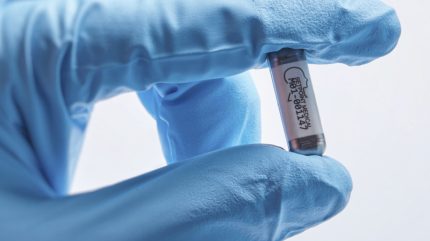
SetPoint Medical has been given an investigational device exemption (IDE) from the US Food and Drug Administration (FDA) greenlighting it to begin a clinical trial to test its modulation platform in relapsing-remitting multiple sclerosis (RRMS) patients.
The multicenter, randomised, double-blind, sham-controlled pilot study will be conducted in the US and will be initiated in 2025. The US-based company expects to enrol 60 patients with the autoimmune disorder in the trial.

Discover B2B Marketing That Performs
Combine business intelligence and editorial excellence to reach engaged professionals across 36 leading media platforms.
SetPoint’s device – named the SetPoint System – is an implantable and rechargeable neurostimulation device that targets the vagus nerve via electrical stimulation to reduce inflammation. The therapy stimulates the nerve once daily and works by activating innate anti-inflammatory pathways and immune-restorative processes.
A SetPoint spokesperson told Medical Device Network that the company will be “evaluating numerous endpoints to best understand the potential of remyelination” with its device.
“This includes safety assessments as well as changes in electro-physiologic measurements, imaging, and functional and clinical outcomes, including visual acuity and disability scores,” they added.
The ceramic and titanium-cased device is implanted in the neck and can be programmed by physicians via an iPad application. Patients can also recharge the device themselves using a wireless charger.

US Tariffs are shifting - will you react or anticipate?
Don’t let policy changes catch you off guard. Stay proactive with real-time data and expert analysis.
By GlobalDataThe device has breakthrough device designation by the FDA in multiple sclerosis (MS) and, in March this year, was accepted onto the total product life cycle advisory programme (TAP), the latter also designed to expedite patient access to innovative medical devices.
MS is an autoimmune disease that affects nearly one million people in the US. It damages the myelin sheath surrounding nerve fibres, causing disruption to the signals between the brain and other regions in the body. SetPoint states that whilst there are approved medicines to help manage the disease and slow progression, no available treatments address the root cause of the condition.
SetPoint announced positive topline results from a clinical study investigating its technology in patients with moderate-to-severe rheumatoid arthritis. The randomised trial (NCT04539964), which involved 250 participants, met its primary endpoint with low adverse event rates. SetPoint is also at an advanced clinical stage for its device in Crohn’s disease.
SetPoint’s chief medical officer David Chernoff said: “We look forward to initiating this pilot study to advance SetPoint’s platform in another therapeutic area.”
Chernoff added that preclinical models indicate its technology can “reduce demyelination and promote remyelination”, which provides “new hope for people living with MS.”
The neuromodulation market is expanding rapidly as technology advances, making the approach a viable alternative to regular medication. A market model by GlobalData estimates the global neuromodulation device market will be worth $11.4bn by 2033, up from $6bn in 2022.





